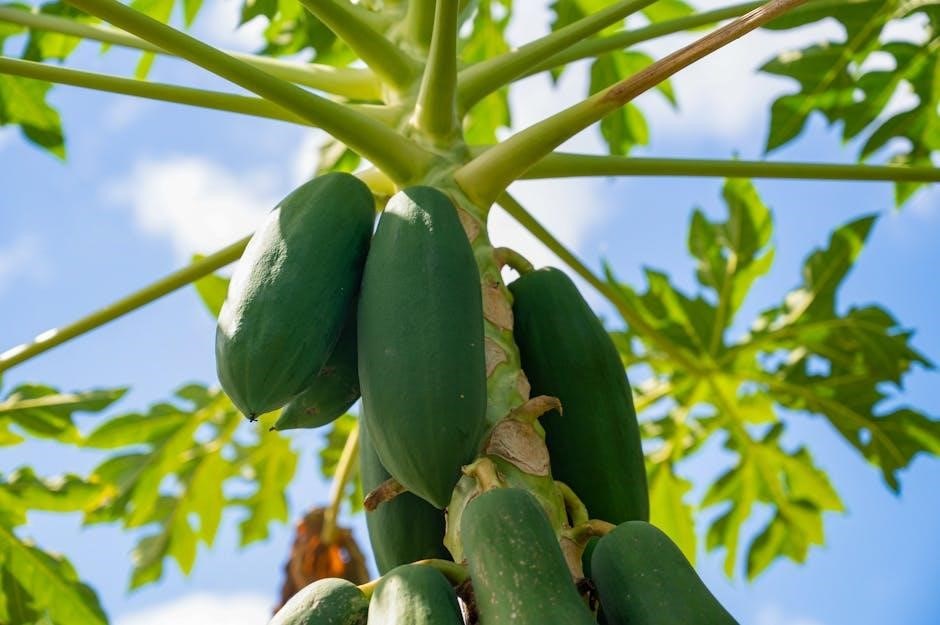Lymphedema‚ a chronic condition causing swelling due to lymphatic system dysfunction‚ can be managed through dietary adjustments. A balanced diet focusing on anti-inflammatory foods‚ adequate protein‚ and hydration helps alleviate symptoms and supports overall well-being.
1.1. Understanding Lymphedema: Definition and Causes
Lymphedema is a chronic condition characterized by the abnormal accumulation of protein-rich fluid in the interstitial tissue‚ leading to swelling in one or more extremities. It occurs when the lymphatic system is impaired‚ either due to genetic mutations or damage from surgery‚ radiation‚ infection‚ or trauma. This disruption hinders the lymphatic system’s ability to transport lymph fluid‚ resulting in swelling and potentially causing discomfort‚ limited mobility‚ and increased risk of infections. Understanding the causes is crucial for developing effective management strategies‚ including dietary adjustments and lifestyle changes‚ to alleviate symptoms and improve quality of life.
1.2. The Role of Nutrition in Managing Lymphedema Symptoms
Nutrition plays a crucial role in managing lymphedema symptoms by reducing inflammation‚ promoting weight control‚ and supporting overall lymphatic health. A balanced diet rich in anti-inflammatory foods‚ such as fruits‚ vegetables‚ and whole grains‚ helps minimize swelling. Protein intake is essential for tissue repair‚ while healthy fats‚ like omega-3s‚ reduce inflammation. Avoiding excessive sodium and processed sugars can prevent fluid retention. Staying hydrated and limiting alcohol and caffeine are also beneficial. Tracking symptoms through a food diary can help identify triggers. A well-planned diet not only alleviates lymphedema symptoms but also enhances overall well-being and supports long-term health goals.

Key Components of a Lymphedema Diet
A lymphedema diet focuses on anti-inflammatory foods‚ lean proteins‚ whole grains‚ and healthy fats‚ minimizing sodium and sugars while incorporating omega-3s to reduce inflammation.
2.1. Anti-Inflammatory Foods: Their Importance and Examples
Anti-inflammatory foods are crucial in managing lymphedema‚ as they reduce swelling and promote lymphatic health. Examples include fatty fish (like salmon and mackerel)‚ berries‚ leafy greens‚ and nuts. These foods‚ rich in omega-3 fatty acids and antioxidants‚ help combat inflammation and improve overall well-being. Incorporating these into your diet can alleviate symptoms and support long-term lymphedema management. A focus on whole‚ nutrient-dense foods is essential for optimizing lymphatic function and reducing discomfort.
2.2. Reducing Sodium Intake to Minimize Fluid Retention
Reducing sodium intake is vital for managing lymphedema‚ as excessive sodium can lead to fluid retention and worsen swelling. Limiting sodium helps decrease fluid buildup in tissues. Aim for no more than 2‚300 mg of sodium daily‚ and opt for low-sodium alternatives. Avoid processed foods‚ canned goods‚ and restaurant meals‚ which are often high in sodium. Flavor foods with herbs and spices instead of salt. Monitoring sodium intake can help alleviate lymphedema symptoms and improve overall comfort. A low-sodium diet supports lymphatic health and reduces the risk of complications.
2.3. Incorporating Protein-Rich Foods for Tissue Health
Incorporating protein-rich foods into your diet is essential for maintaining tissue health and supporting lymphatic function. Protein helps repair and strengthen tissues‚ reducing the risk of further swelling. Include lean meats‚ fish‚ eggs‚ dairy‚ and plant-based options like beans‚ lentils‚ and tofu. Adequate protein intake promotes muscle health and overall recovery. Avoid excessive intake‚ as it can strain the lymphatic system. Balancing protein with other nutrients ensures optimal lymphedema management and supports long-term tissue integrity. Prioritize high-quality‚ unprocessed protein sources to maximize benefits and minimize inflammation.
2.4. Healthy Fats and Their Impact on Inflammation

Healthy fats play a crucial role in reducing inflammation‚ a key factor in managing lymphedema. Omega-3 fatty acids found in fatty fish‚ flaxseeds‚ and walnuts help combat inflammation and support lymphatic health. Avocados‚ nuts‚ and seeds are also excellent sources of monounsaturated and polyunsaturated fats‚ which promote healing and reduce swelling. Incorporating these fats into your diet can help alleviate lymphedema symptoms by minimizing inflammation and supporting tissue repair. Moderation is essential‚ as excessive fat intake can lead to weight gain‚ which may worsen lymphedema. Focus on unprocessed sources to maximize benefits and maintain a balanced intake.
2.5. The Importance of Fiber in a Lymphedema Diet
Fiber is essential in a lymphedema diet as it aids digestion‚ reduces inflammation‚ and supports weight management. High-fiber foods like fruits‚ vegetables‚ and whole grains help regulate blood sugar levels and prevent sudden spikes‚ which can exacerbate inflammation. A fiber-rich diet also promotes satiety‚ assisting in maintaining a healthy weight‚ a critical factor in managing lymphedema. Additionally‚ fiber helps reduce fluid retention by improving circulation and lymphatic function. Incorporating fiber into meals can alleviate symptoms and contribute to overall lymphatic health‚ making it a vital component of a lymphedema management plan.

Foods to Avoid in a Lymphedema Management Plan
Processed foods‚ sugary foods and drinks‚ and saturated fats should be avoided as they can increase inflammation and fluid retention‚ worsening lymphedema symptoms and swelling.
3.1. Processed Foods and Their Negative Effects
Processed foods are high in sodium‚ unhealthy fats‚ and added sugars‚ which can increase inflammation and fluid retention‚ worsening lymphedema symptoms. These foods often lack essential nutrients and can lead to weight gain‚ further complicating lymphedema management. Regular consumption of processed foods can also impair lymphatic function‚ making it harder for the body to drain excess fluid. It is recommended to minimize or avoid processed foods and opt for whole‚ nutrient-rich foods to support lymphatic health and overall well-being.
3.2. Sugary Foods and Drinks: Impact on Inflammation
Sugary foods and drinks contribute to inflammation‚ which can exacerbate lymphedema symptoms. High sugar intake leads to insulin resistance and oxidative stress‚ promoting chronic inflammation. Refined sugars in snacks and sodas trigger inflammatory responses‚ worsening swelling and discomfort. Limiting sugary items is crucial for managing lymphedema effectively. Opting for natural sources of sugar‚ such as fruits‚ which provide fiber and antioxidants‚ can help reduce inflammation. Avoiding sugary beverages and processed treats supports lymphatic health and overall well-being.
3.3. Saturated Fats and Their Role in Inflammation
Saturated fats can trigger inflammation‚ worsening lymphedema symptoms. Found in red meat‚ full-fat dairy‚ and processed foods‚ these fats promote inflammatory pathways‚ increasing swelling and discomfort. Reducing saturated fat intake helps minimize inflammation and fluid retention‚ which is crucial for managing lymphedema. Opting for healthier fats‚ such as monounsaturated and polyunsaturated fats‚ supports overall lymphatic health. Limiting saturated fats as part of a balanced diet is essential for controlling inflammation and improving quality of life for those with lymphedema.

Hydration and Its Role in Lymphedema Management
Hydration is crucial for lymphatic function‚ aiding fluid circulation and reducing swelling. Drinking plenty of water helps maintain lymph flow and overall health‚ while avoiding alcohol and caffeine prevents dehydration.
4.1. Staying Hydrated: Why Water is Essential
Hydration plays a vital role in lymphedema management by supporting lymphatic circulation and fluid balance. Water helps maintain the viscosity of lymph fluid‚ ensuring efficient drainage and reducing swelling. Even mild dehydration can impair lymphatic function‚ worsening symptoms. Drinking plenty of water throughout the day is recommended‚ while avoiding alcohol and caffeine‚ which can dehydrate the body. Proper hydration not only supports lymphatic health but also promotes overall well-being‚ making it a cornerstone of lymphedema care.
- Water aids in maintaining lymphatic flow and fluid balance.
- Dehydration can exacerbate lymphedema symptoms.
- Alcohol and caffeine should be avoided due to their diuretic effects.
4.2. Avoiding Alcohol and Caffeine
Avoiding alcohol and caffeine is crucial for effective lymphedema management. Both substances act as diuretics‚ increasing fluid loss and dehydration‚ which can impair lymphatic function; Alcohol also inflames tissues‚ worsening swelling‚ while caffeine can further dehydrate the body‚ reducing lymph flow efficiency. Limiting or eliminating these beverages helps maintain proper hydration and supports lymphatic health. Instead‚ opt for herbal teas or natural juices to stay hydrated without compromising lymphedema management.
- Alcohol and caffeine act as diuretics‚ increasing fluid loss.
- Dehydration impairs lymphatic circulation and worsens symptoms.
- Herbal teas and natural juices are healthier alternatives.

Exercise and Weight Management in Lymphedema
Exercise and weight management are vital for lymphedema care. Regular physical activity improves lymphatic circulation‚ while maintaining a healthy weight reduces swelling and enhances overall mobility. Gentle exercises like swimming and yoga are recommended.
- Exercise promotes lymphatic fluid circulation.
- Weight management reduces lymphedema severity.
- Gentle exercises‚ such as yoga‚ are beneficial.
5.1. The Link Between Obesity and Lymphedema
Obesity significantly increases the risk of developing lymphedema‚ as excess body fat promotes inflammation and impairs lymphatic drainage. A higher body mass index (BMI) can exacerbate swelling and discomfort. Maintaining a healthy weight through a balanced diet and regular exercise is crucial for managing lymphedema symptoms. Excess weight places additional strain on the lymphatic system‚ making it harder for lymph fluid to circulate effectively. Therefore‚ weight management is a critical component of lymphedema care‚ helping to reduce inflammation and improve overall lymphatic function.
5.2. Exercise Routines to Support Lymphatic Health
Exercise plays a vital role in supporting lymphatic health by promoting lymph flow and reducing swelling. Gentle movements‚ such as yoga or swimming‚ are ideal as they stimulate circulation without overexertion. Activities that involve arm or leg movements‚ like cycling or brisk walking‚ can also aid lymphatic drainage. Strength training should be avoided if it causes muscle strain. Consistent‚ low-impact exercises help maintain muscle tone and improve overall mobility. Consulting a healthcare provider to design a personalized exercise plan is recommended to ensure safety and effectiveness for lymphedema management.

Omega-3 Fatty Acids and Their Benefits
Omega-3 fatty acids are essential for reducing inflammation and supporting lymphatic health. They play a crucial role in managing lymphedema symptoms and promoting overall well-being naturally.
6.1. How Omega-3 Fatty Acids Reduce Inflammation
Omega-3 fatty acids‚ particularly EPA and DHA‚ are potent anti-inflammatory agents. They inhibit the production of pro-inflammatory molecules‚ such as eicosanoids and cytokines‚ which contribute to swelling and discomfort in lymphedema. By modulating the immune response and reducing inflammation‚ omega-3s help alleviate lymphatic system strain. Their anti-inflammatory properties also support overall vascular health‚ enhancing lymph fluid circulation and reducing tissue damage. Incorporating omega-3-rich foods‚ like fatty fish‚ flaxseeds‚ and walnuts‚ into a lymphedema diet can significantly aid in managing symptoms and improving quality of life for individuals with this condition.
6.2. Food Sources Rich in Omega-3 Fatty Acids
Fatty fish like salmon‚ mackerel‚ and sardines are excellent sources of omega-3s‚ particularly EPA and DHA. These fats help reduce inflammation and support lymphatic health. Plant-based sources‚ such as flaxseeds‚ chia seeds‚ and walnuts‚ provide ALA‚ a precursor to EPA and DHA. Incorporating these foods into a lymphedema diet can help manage inflammation and improve overall well-being. Regular consumption of omega-3-rich foods is a natural way to support lymphatic function and alleviate lymphedema symptoms.

Considerations for Specific Diets
Certain diets‚ like the Mediterranean and DASH diets‚ emphasize whole foods and healthy fats‚ aligning well with lymphedema management. Other diets‚ such as ketogenic or Atkins‚ may require careful consideration and consultation with a healthcare provider to ensure they meet nutritional needs and support lymphatic health effectively.
7.1. The Mediterranean Diet: Is It Suitable?
The Mediterranean Diet is highly suitable for managing lymphedema due to its emphasis on anti-inflammatory foods‚ whole grains‚ fruits‚ vegetables‚ and healthy fats like olive oil. It promotes a balanced intake of protein‚ fiber‚ and omega-3 fatty acids‚ which are beneficial for reducing inflammation and supporting lymphatic health. The diet’s focus on lean proteins‚ such as fish and poultry‚ and its avoidance of processed foods align well with the nutritional needs of individuals with lymphedema. Additionally‚ the Mediterranean Diet encourages hydration through water and herbal teas‚ further supporting overall well-being and lymphatic function.
7.2. The DASH Diet: Its Relevance to Lymphedema
The DASH (Dietary Approaches to Stop Hypertension) Diet is a low-sodium‚ nutrient-rich plan that emphasizes fruits‚ vegetables‚ whole grains‚ and lean proteins. Its focus on reducing sodium intake aligns with lymphedema management goals‚ as excess sodium can exacerbate fluid retention. The diet’s emphasis on potassium-rich foods‚ such as leafy greens and bananas‚ helps balance fluid levels in the body. Additionally‚ its anti-inflammatory properties and promotion of overall vascular health make it a suitable option for supporting lymphedema symptoms and improving quality of life.
7.3. Ketogenic and Atkins Diets: Are They Appropriate?
The ketogenic and Atkins diets‚ both low-carbohydrate and high-fat‚ may not be ideal for lymphedema management. While they can promote weight loss‚ which is beneficial‚ their high fat content could potentially increase inflammation. Additionally‚ the restrictive nature of these diets may lead to nutrient imbalances‚ which could negatively impact lymphatic health. There is limited research supporting their use specifically for lymphedema‚ making them less recommended compared to balanced diets like the Mediterranean or DASH‚ which emphasize whole‚ anti-inflammatory foods and moderate fat intake.

The Role of Supplements in Lymphedema Management
Supplements like antioxidants may help reduce inflammation‚ potentially benefiting lymphedema management. However‚ evidence for other supplements is limited‚ and their effectiveness remains uncertain.
8.1. Antioxidants and Their Role in Reducing Inflammation
Antioxidants play a crucial role in reducing inflammation‚ which is beneficial for managing lymphedema. These compounds help combat oxidative stress‚ a key contributor to inflammation. Foods rich in antioxidants‚ such as berries‚ leafy greens‚ and nuts‚ can support lymphatic health. Additionally‚ certain supplements like vitamin C and E are known for their antioxidant properties. By incorporating these into your diet‚ you may help minimize inflammation and improve lymphatic function. However‚ it’s important to consult a healthcare provider before starting any new supplement regimen to ensure it aligns with your overall treatment plan.
8.2. Other Supplements: Do They Help?
Beyond antioxidants‚ certain supplements may offer additional benefits for lymphedema management. Turmeric‚ boswellia‚ and ginger are known for their anti-inflammatory properties‚ which can help reduce swelling. Magnesium and potassium supplements may aid in fluid balance and muscle function. However‚ there is limited research specifically linking these supplements to lymphedema relief. Always consult a healthcare provider before adding new supplements to your regimen‚ as they can interact with medications or have side effects. A personalized approach ensures safety and effectiveness in your treatment plan.

Monitoring and Adjusting Your Diet
Regularly tracking your symptoms and dietary choices helps identify what works best for you. Adjustments may be needed to optimize comfort‚ reduce swelling‚ and promote long-term well-being.
9.1. Keeping a Food Diary to Track Symptoms
Maintaining a food diary is a powerful tool for managing lymphedema. By recording daily food intake‚ portion sizes‚ and symptoms‚ individuals can identify dietary triggers and patterns. This helps in making informed adjustments to reduce inflammation and swelling. Note how specific foods affect your condition and share this information with your healthcare provider. Consistent tracking also promotes accountability and long-term adherence to a balanced diet. Over time‚ this practice can lead to better symptom control and improved overall lymphedema management.
9.2. Regular Consultations with a Healthcare Provider
Regular consultations with a healthcare provider are crucial for effective lymphedema management. A healthcare professional can tailor dietary recommendations to individual needs‚ ensuring the best outcomes. They monitor progress‚ adjust plans‚ and address concerns. Collaborating with a provider helps integrate nutrition with other therapies‚ promoting holistic care. Schedule follow-ups to review food diaries‚ discuss challenges‚ and celebrate successes. This partnership ensures a personalized approach‚ optimizing symptom control and enhancing quality of life for those managing lymphedema.
Managing lymphedema requires a holistic approach that combines diet‚ exercise‚ and medical guidance. A balanced diet rich in anti-inflammatory foods‚ adequate hydration‚ and regular physical activity supports lymphatic health. Monitoring symptoms and consulting healthcare providers ensures personalized care. While no single diet cures lymphedema‚ mindful eating and lifestyle adjustments can significantly improve quality of life. By adopting these strategies‚ individuals can effectively manage symptoms and promote long-term well-being.


